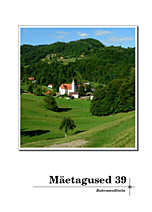Etnomeditsiin
Ethnomedicine
Author(s): Birgitte RørbyeSubject(s): Customs / Folklore
Published by: Eesti Kirjandusmuuseum
Keywords: health care; ethnomedicine; conception of disease; illness behaviour; tale of disease; patient; folk healers; folk tales; health myth
Summary/Abstract: Research in ethnomedicine involves the observance of the views, principles, and behaviour regarding illnesses and diseases by different people and cultures. The activities of folk healers and turning to them for help are still topical, even though the awareness of people has grown and the level of education is considerably higher than in the past. Nevertheless, it appears that regardless of the availability of medical care, there are always patients who turn only to folk healers. Another group of people who tend to turn to folk healers for help are those whose treatment by medical professionals has not been successful. In folklore the theme is represented by tales of diseases and illnesses, in which the main characters are a positive or negative patient and a positive or negative healer. These often stereotypical folktales are almost the only material that enables drawing conclusions on the illness behaviour of the customers of folk healers. The reason behind all that is that the society is steadfastly fixated on the health myth. Source: Rørbye, Birgitte 1982. Ethnomedicine. Ethnologia Scandinavica: A Journal for Nordic Ethnology, vol. 12. Lund: Folklivsarkivet, pp. 53–85.
Journal: Mäetagused. Hüperajakiri
- Issue Year: 2008
- Issue No: 39
- Page Range: 93-136
- Page Count: 44
- Language: Estonian

